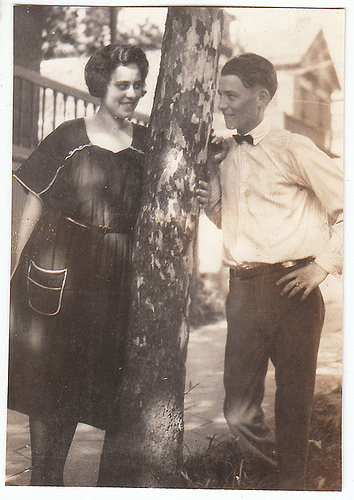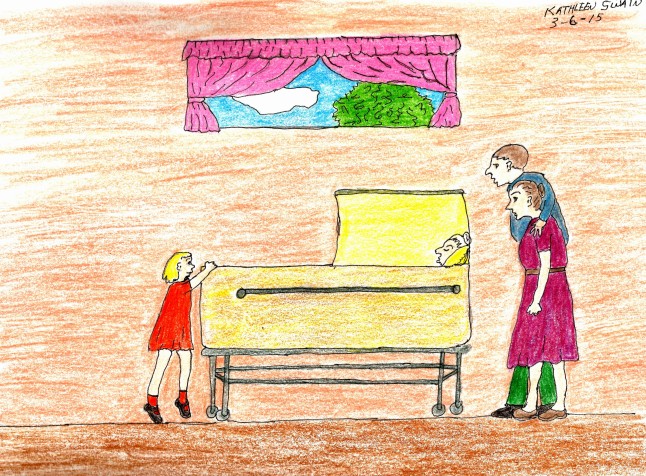 http://suttonhistoricalsociety.blogspot.com/2014/07/the-flour-sack-underwear-poem.html#links
http://suttonhistoricalsociety.blogspot.com/2014/07/the-flour-sack-underwear-poem.html#links
“I was never so proud of anything as that bus ticket. I wrote back that afternoon I’d be on the four o’clock bus the next day. I rushed around and got our clothes washed and ironed. It didn’t take long to pack your four little dresses, nightgown, flour sack panties, slips and socks in a cardboard box tied up with string. By that time I was down to two dresses, a slip, and three pair of flour sack panties. I made room for Mama’s Bible recording our marriage, you two kids’ birthdate and Jimmy’s death. I’d got so skinny, I didn’t get another brassiere when mine wore out. Aunt Lucy wasn’t able to go to the bus station. She was down in her back. I cried when I kissed her, not knowin’ if I’d ever see her again. We set out walkin’ three miles to the bus station before it was good light, wearing cotton dresses and our only sweaters. You was draggin’ a little rag doll Aunt Lucy had made you out of a flour sack and a wore-out apron. Nobody wasted nothin’, then. Our little bit of stuff got mighty heavy before we made it half a mile down that dusty road. I had to stop and let you sit on the box and rest a time or two. I couldn’t carry you, the box, and the sack lunch Aunt Lucy had packed. Lucky for us, Amos Jones came by in his old pick up and gave us ride. He stopped off at the café and we had coffee, since we’d got there early. He bought you a glass of milk and gave you the fried egg sandwich he’d brung for his lunch. I sure was proud. You’d been too sleepy to eat good when we left Aunt Lucy’s and I wanted to make our lunch last. When he left, he made me take a dollar. He growed up with your daddy and wanted to do something for his old friend. I figured it was his last dollar. It was for sure my only dollar and I was proud to git it. I sure hope it didn’t hurt him too bad to give it, but he wouldn’t let me refuse. It’s funny how folks with the least to give is the most likely to help.
Amos and his wife had four kids. Aunt Lucy wrote me ‘bout a year later his wife died in childbirth leavin’ him with all the kids and a sick baby. About two months later he married a widow-woman who had a baby ‘bout the same age. A tractor had rolled over on her husband just before her baby was born. She married him moved right in to take care of his kids and nurse the baby. She knew folks would talk bad about them marryin’ so soon, but they both had to have some help. I sure wouldn’t have thought bad about them. They was just doin’ what they had to to take care of their young’uns.”
Jenny didn’t know anything about that kind of desperation. “Didn’t she have any family or friends she could have stayed with till she could have gotten a job? I can’t imagine marrying that quick if something happened to Ben. You’d need some time to mourn. They couldn’t have loved each other.”
“Honey, I’m glad you don’t remember nothin’ about a life that hard. If that woman had folks, they might’a been starvin’ too. Most men didn’t have jobs, ‘cept farmin’. A woman had to be powerful lucky to come up with a job. If a feller had a job to give, it went to a man with a family. Until your Uncle Marsh found me that dishwashin’ job where he worked, I did any work I could git. I sat with the sick, nursed new mama’s, helped with crops and canning. I almost never got a nickel. I was workin’ for food and a place for me and you to sleep, and lots of time, havin’ to dodge the menfolks. If I went to milk, I took you with me so you got some milk right off. If I worked in the kitchen, I tried to slip you a little somethin’. I never threw a biscuit out, even if it was left on somebody’s plate. That might be all the supper you was gittin’. I was always scared you was gonna starve. They was whole families walkin’ down the road with nothin’ but the clothes on their backs. I was always skeert that was gonna be you and me. Lots of folks starved. It was rough! To this day, I won’t leave a penny laying in the road. That could end up the last penny I’d git.”
Jenny hugged her little one. “It must have been awful worryin’ about your baby being hungry. I’d move heaven and earth to take care of Lucy. I worry if I don’t eat right so she can get plenty. I know if something happened to me, Ben would do the best he could, but he’d have to learn everything. If something ever happened to me, would you come take care of Lucy?”
“Why sure I would, honey, but don’t borrow trouble. You’ll spoil your milk. Let’s talk about something happy. I never saw anybody so proud as you after your daddy got home and Shirley was born. You thought you was her mama. One morning she squalled out while I was at the clothesline. Before I could git in there, you’d got up in the crib with her and took your dress off. You had her cuddled up to your little flat chest tryin’ to nurse her. She couldn’t find nothin’ and she was mad as hops. You was such a little mama.”
“Ooh, don’t tell Ben that one. He’d carry me high. I’d never hear the last of it. How is Shirley? Have you heard from her since you got here?”
“No, she’s got her hands full with them three little ones, an’ Martin workin’ nights, trying to sleep days. I never could’a kept y’all quiet. That’s why I started keepin’ ‘em at my place instead of goin’ over there when she’s teachin’. Joey starts school next fall, though, so that’ll just leave Betsy and Marty with me durin’ the day. Them two is a handful. She’s kind a’talkin’ ‘bout havin’ another one, but I hope she’ll take a little time with it, till them girls is a little bigger. I’m glad you had this one in May so I can stay the whole summer with you. What are you gonna do when you go back to work? I wish I lived close enough so I could keep her.”
“Well, I haven’t told Ben, but I’m thinking about staying home with her. As long as it took her to come along, I don’t know if I’ll be able to have another one. He’s doing really well down at the hardware store. By the time I got somebody in to keep her, I wouldn’t come out much ahead workin’. You know how that is, don’t you.” She reached over and squeezed her mother’s wrinkled hand.
https://nutsrok.wordpress.com/2017/02/12/just-folks-getting-by-part-1/
https://nutsrok.wordpress.com/2017/02/13/just-folks-getting-by-part-2/
https://nutsrok.wordpress.com/2017/02/14/just-folks-getting-by-part-3/
https://nutsrok.wordpress.com/2017/02/15/just-folks-getting-by-part-4/
https://nutsrok.wordpress.com/2017/02/16/just-folks-getting-by-part-5/

 “Mama, how come I had to live in that orphanage for a while when I was little?
“Mama, how come I had to live in that orphanage for a while when I was little?
 I grew up in a family of competitive storytellers. A little thing like a stubbed toe gets us started. “Do you remember the time Grandpa cut his ingrown toenails out then fooled around and set his toe on fire?” That is not a hypothetical example. It’s beloved and oft-repeated tale.
I grew up in a family of competitive storytellers. A little thing like a stubbed toe gets us started. “Do you remember the time Grandpa cut his ingrown toenails out then fooled around and set his toe on fire?” That is not a hypothetical example. It’s beloved and oft-repeated tale. 













 Clothing made from feed sacks was a great boon to the economy of the cash-strapped depression. Farm wives eagerly collected and traded these pretty printed bags. Three would make a nice ladies dress, provided the skirt was not too full. Two would make a short-sleeved shirt for a man when plaids and stripes came in. My mother was born deep in The Great Depression and remembers her mother showing the store-owner a scrap and asking him to “Try to get me one more of this nice rose print if any come in.” Crisply starched and ironed, they made sturdy, attractive dresses. Fading was a problem. Hems were deep so they could be let down. Her mother frequently used rick-rack to conceal the fade line when the hem was dropped. The tie belts at the waist made it possible to adjust for longer wear.
Clothing made from feed sacks was a great boon to the economy of the cash-strapped depression. Farm wives eagerly collected and traded these pretty printed bags. Three would make a nice ladies dress, provided the skirt was not too full. Two would make a short-sleeved shirt for a man when plaids and stripes came in. My mother was born deep in The Great Depression and remembers her mother showing the store-owner a scrap and asking him to “Try to get me one more of this nice rose print if any come in.” Crisply starched and ironed, they made sturdy, attractive dresses. Fading was a problem. Hems were deep so they could be let down. Her mother frequently used rick-rack to conceal the fade line when the hem was dropped. The tie belts at the waist made it possible to adjust for longer wear.